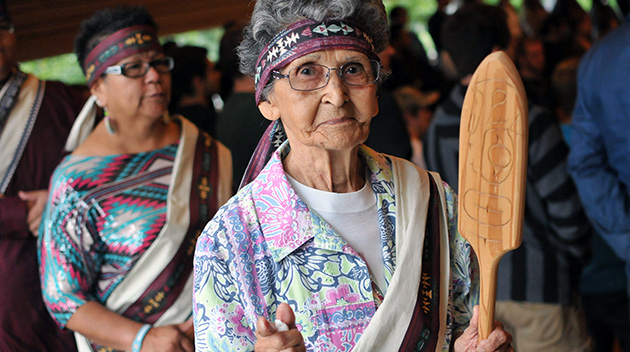The events of September 18, 2013 are elegantly documented by UFV Marcom’s senior editor Anne Russell in her post, UFV Indian Residential School Day of Learning examines Canada’s “greatest moment of shame”
Her post is repeated here:
“Children are supposed to grow up with their parents and families.” — Dr. Eric Davis
It sounds like a basic human right, but for several generations in Canada, it was a right that was denied to most Aboriginal people, as children were forcibly taken away from their families to attend church-run residential schools. It was a federal government policy that was unapologetically assimilationist.
When Eric Davis, UFV’s provost and vice-president academic, spoke at UFV’s Indian Residential School Day of Learning, he drew a connection between some of the worst episodes in human history and the Indian Residential School experience.
“Many countries have had a moment of great shame,” he said.
“Germany had the Holocaust, and South Africa had Apartheid. The Indian Residential Schools are Canada’s greatest moment of shame. It should be unimaginable for Canadian students to graduate without some understanding of this experience, but the vast majority of students do graduate from university without that understanding.”
Holding a day-long, multi-campus symposium that transformed the entire university curriculum for one day was UFV’s way of giving its students the opportunity to learn about the history of residential schools.
“Today, we all learned something about the truth of the residential schools, and it is an awful truth. Children are supposed to grow up with their parents and families, and find school a liberating, positive, experience. This didn’t happen. The residential schools were a perversion of education.
“When my country, Canada, created, funded, and oversaw the residential schools in order to commit cultural genocide, to eliminate the culture and identity of Indigenous people, it tore the world. We all have responsibility for repairing it.”
What happened at UFV on September 18 was a step in the direction of reconciliation.
There was ritual, ceremony, dancing, drumming, and singing — all part of the Aboriginal tradition — but there were also deeply personal, grief-filled, hard-hitting, emotional sessions featuring survivors of the residential school system sharing their stories.
SHARING EXPERIENCE & HOPE
At the afternoon presentation by 3 Crows Productions, UFV alumnus Dallas Yellowfly showed excerpts from a video he produced relating the experiences of Cyril Pierre and the abuse he suffered at the St. Mary’s Indian Residential School in Mission.
Pierre and fellow sexual abuse survivor Joe Ginger then spoke about their experiences to a hushed audience.
“I came out of residential school with huge sense of rage,” said Ginger. “It is difficult to tell the stories of our experiences. The process to be able to speak about this is a long one. My version of reconciliation is that I accept what has happened to me and that as a child I had no control.”
“What happened to us as young children was real,” said Pierre. “It is still a problem today. I personally find the idea of reconciliation very difficult. I was robbed of my childhood. I cannot forgive.”
“Reconciliation, or indigenization, doesn’t happen overnight,” said Eric Davis. “It is a process, one we began a few years ago, one which will stretch on for years to come. We must make it an integral part of the UFV experience. Making truth and reconciliation an integral part of the UFV experience is not a burden; it is a gift. A gift we share with our students and communities. It brings us together, and together we are strong enough to heal, repair, and transform the world.”
Herb Joe, a highly respected educational and cultural leader in the Stó:lõ community and emcee for the event, said that 100 per cent of Aboriginal Canadians are affected by the residential school experience.
“It took my mom until she was in her 60s to be able to say ‘I love you’— and then she wouldn’t stop. You can close wounds, but scars do not go away.”
Earlier in the day, UFV Elder-in-Residence Eddie Gardner shared his vision of hope: “We can rise from the ashes of the IRS experience and pull together for a better future.”
When he was asked to “witness” and share his thoughts based on his experience at the IRS Day of Learning, UFV theatre department head Bruce Kirkley recalled living near a residential school briefly as a boy in Portage La Prairie.
“I would drive by those kids behind the fence and wonder why they couldn’t come out and play,” he recalled.”Through today’s experience, through the work we’re doing, and through watching those little boys dancing their traditional dances with joy at the opening ceremony this morning, we are tearing down fence that kept me from connecting with those trapped behind it.”
Several people thanked UFV via social media for arranging the day.
“My hands are raised up to UFV for organizing a successful event that brought much-needed awareness to others,” said one person.
See more photos of the event on UFV’s Facebook page: Facebook.com/goUFV



Comments are closed.